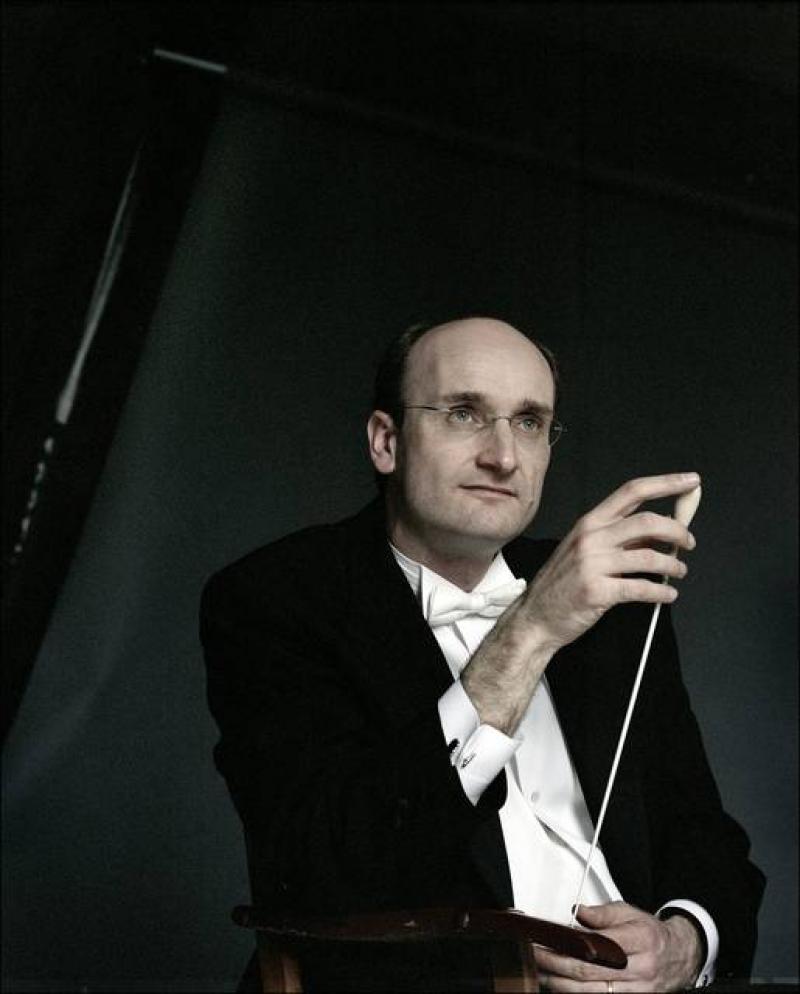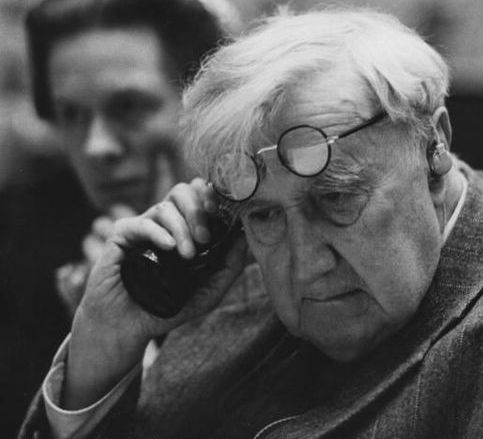BBC Proms: BBC Scottish Symphony Orchestra, Manze | reviews, news & interviews
BBC Proms: BBC Scottish Symphony Orchestra, Manze
BBC Proms: BBC Scottish Symphony Orchestra, Manze
Three Vaughan Williams symphonies don't prove too much, but Manze should have watched the speedometer

One chocolate bar, OK. But eating three in a row? Is that altogether wise? Some may feel the same about a concert containing three symphonies by Vaughan Williams: a third of his output in the form. Even the most committed lover of this visionary and still under-appreciated British composer might worry a little at the prospect, as we might at a heavy night of Beethoven or Brahms. Each symphony, to be sure, is coloured with different forms and emotions.
At the same time, and hearteningly, the prospect of Andrew Manze’s Vaughan Williams bonanza clearly put few people off. The Albert Hall was packed, the audience concentration considerable, the enthusiasm wide and warm. A period instrument violinist no longer – pity, that, he was damned good – Manze is now the BBC Scottish Symphony Orchestra’s Associate Conductor, and he planned this experience to make a point. He’s on a mission, he says, to rehabilitate Vaughan Williams (pictured below) in people’s minds, to position him not as a parochial figure, cowpat at hand, sucking on a straw, but as a major international force in 20th-century music.
If ever Manze offers you a lift in his car, I’d strongly advise you to say noManze certainly chose his symphonies wisely: numbers four, five and six, the best of the set, written during the troubled times of the 1930s and 1940s, with some of the troubles reflected in the music. Whether he always conducted them wisely is another matter. If ever Manze offers you a lift in his car, I’d strongly advise you to say no. For this man’s an absolute speed demon. In each of Vaughan Williams’ allegros he regularly exceeded the speed limit, forcing the orchestra to hurtle through material that needed a little more space and breadth to make an impact and bare its teeth. He did it in front of BBC Four’s cameras too, so he’s bound to get a ticket.
 The raging and angry Fourth, beneficiary in 1937 of an astonishingly volcanic recording by Vaughan Williams himself, was a particular victim of Manze’s impatience. Grinding dissonances, demonic rhythms, sarcastic snarls: they passed us by almost in a blur. The Sixth, written in the mid 1940s and pockmarked with the kind of martial rattle and eerie desolation usually associated with Shostakovich, was also damaged by hurtling. Only the Fifth, the concert’s high point and the most serene and affirmative of the symphonies, consistently kept its cool, nagging away gently at harmonic tensions before resolving its argument in a shimmering radiance gorgeous to behold.
The raging and angry Fourth, beneficiary in 1937 of an astonishingly volcanic recording by Vaughan Williams himself, was a particular victim of Manze’s impatience. Grinding dissonances, demonic rhythms, sarcastic snarls: they passed us by almost in a blur. The Sixth, written in the mid 1940s and pockmarked with the kind of martial rattle and eerie desolation usually associated with Shostakovich, was also damaged by hurtling. Only the Fifth, the concert’s high point and the most serene and affirmative of the symphonies, consistently kept its cool, nagging away gently at harmonic tensions before resolving its argument in a shimmering radiance gorgeous to behold.
Manze and his players were very good at shimmering; good, too, at tapering down the dynamics to a velvet whisper, with strings at times suggesting the radiance of VW’s Tallis Fantasia. The Fourth’s first movement had its succulent moments of reflection; the Fifth was full of them; while the BBCSSO’s finesse playing pianissimo created much desolate splendour in the disembodied epilogue of the Sixth.
At such times, Manze seemed the perfect man for rehabilitating Vaughan Williams, revealing the music’s originality and beauty, fit for audiences everywhere, and quashing any qualms that three chocolate bars were too much. If only he hadn’t scrambled and squashed chunks of these symphonies by pressing down so hard on the accelerator. Take your time, Mr Manze! The world’s not going to end tomorrow. Or do you know something we don’t?
Explore topics
Share this article
The future of Arts Journalism
You can stop theartsdesk.com closing!
We urgently need financing to survive. Our fundraising drive has thus far raised £49,000 but we need to reach £100,000 or we will be forced to close. Please contribute here: https://gofund.me/c3f6033d
And if you can forward this information to anyone who might assist, we’d be grateful.

Subscribe to theartsdesk.com
Thank you for continuing to read our work on theartsdesk.com. For unlimited access to every article in its entirety, including our archive of more than 15,000 pieces, we're asking for £5 per month or £40 per year. We feel it's a very good deal, and hope you do too.
To take a subscription now simply click here.
And if you're looking for that extra gift for a friend or family member, why not treat them to a theartsdesk.com gift subscription?
more Classical music
 Robin Holloway: Music's Odyssey review - lessons in composition
Broad and idiosyncratic survey of classical music is insightful but slightly indigestible
Robin Holloway: Music's Odyssey review - lessons in composition
Broad and idiosyncratic survey of classical music is insightful but slightly indigestible
 Classical CDs: Wolf-pelts, clowns and social realism
British ballet scores, 19th century cello works and contemporary piano etudes
Classical CDs: Wolf-pelts, clowns and social realism
British ballet scores, 19th century cello works and contemporary piano etudes
 Bizet in 150th anniversary year: rich and rare French offerings from Palazzetto Bru Zane
Specialists in French romantic music unveil a treasure trove both live and on disc
Bizet in 150th anniversary year: rich and rare French offerings from Palazzetto Bru Zane
Specialists in French romantic music unveil a treasure trove both live and on disc
 Scottish Chamber Orchestra, Ibragimova, Queen’s Hall, Edinburgh review - rarities, novelties and drumrolls
A pity the SCO didn't pick a better showcase for a shining guest artist
Scottish Chamber Orchestra, Ibragimova, Queen’s Hall, Edinburgh review - rarities, novelties and drumrolls
A pity the SCO didn't pick a better showcase for a shining guest artist
 Kilsby, Parkes, Sinfonia of London, Wilson, Barbican review - string things zing and sing in expert hands
British masterpieces for strings plus other-worldly tenor and horn - and a muscular rarity
Kilsby, Parkes, Sinfonia of London, Wilson, Barbican review - string things zing and sing in expert hands
British masterpieces for strings plus other-worldly tenor and horn - and a muscular rarity
 From Historical to Hip-Hop, Classically Black Music Festival, Kings Place review - a cluster of impressive stars for the future
From quasi-Mozartian elegance to the gritty humour of a kitchen inspection
From Historical to Hip-Hop, Classically Black Music Festival, Kings Place review - a cluster of impressive stars for the future
From quasi-Mozartian elegance to the gritty humour of a kitchen inspection
 Shibe, LSO, Adès, Barbican review - gaudy and glorious new music alongside serene Sibelius
Adès’s passion makes persuasive case for the music he loves, both new and old
Shibe, LSO, Adès, Barbican review - gaudy and glorious new music alongside serene Sibelius
Adès’s passion makes persuasive case for the music he loves, both new and old
 Anja Mittermüller, Richard Fu, Wigmore Hall review - a glorious hall debut
The Austrian mezzo shines - at the age of 22
Anja Mittermüller, Richard Fu, Wigmore Hall review - a glorious hall debut
The Austrian mezzo shines - at the age of 22
 First Person: clarinettist Oliver Pashley on the new horizons of The Hermes Experiment's latest album
Compositions by members of this unusual quartet feature for the first time
First Person: clarinettist Oliver Pashley on the new horizons of The Hermes Experiment's latest album
Compositions by members of this unusual quartet feature for the first time
 Gesualdo Passione, Les Arts Florissants, Amala Dior Company, Barbican review - inspired collaboration excavates the music's humanity
At times it was like watching an anarchic religious procession
Gesualdo Passione, Les Arts Florissants, Amala Dior Company, Barbican review - inspired collaboration excavates the music's humanity
At times it was like watching an anarchic religious procession
 Classical CDs: Camels, concrete and cabaret
An influential American composer's 90th birthday box, plus British piano concertos and a father-and-son duo
Classical CDs: Camels, concrete and cabaret
An influential American composer's 90th birthday box, plus British piano concertos and a father-and-son duo
 Cockerham, Manchester Camerata, Sheen, Martin Harris Centre, Manchester review - re-enacting the dawn of modernism
Two UK premieres added to three miniatures from a seminal event of January 1914
Cockerham, Manchester Camerata, Sheen, Martin Harris Centre, Manchester review - re-enacting the dawn of modernism
Two UK premieres added to three miniatures from a seminal event of January 1914

Add comment